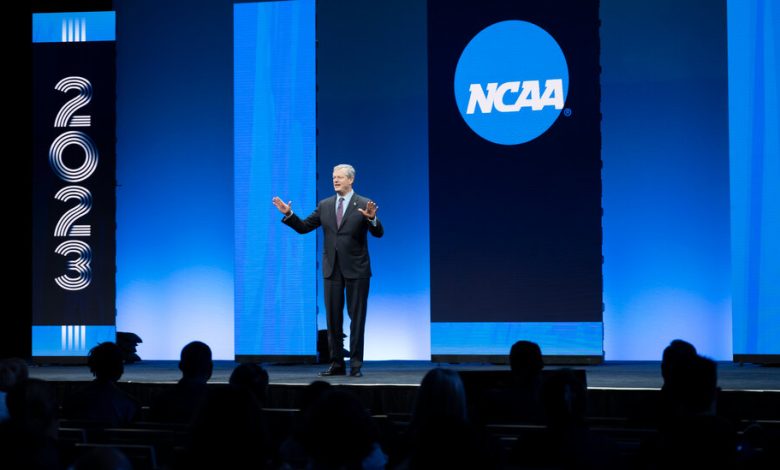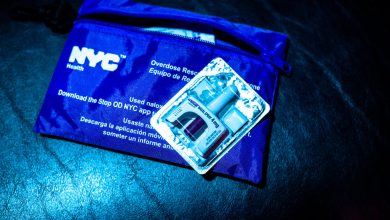The N.C.A.A. Offered Arguments. Judges Had Questions. Many of Them.

PHILADELPHIA — Steven Katz, a lawyer representing the N.C.A.A., had barely cleared his throat Wednesday while appearing before a three-judge panel for a federal appeals court when he was peppered with questions.
As Katz was asserting that the case before the court — the former Villanova defensive back Trey Johnson argues he and other Division I athletes should be considered employees and thus entitled to be paid a minimum wage under the Fair Labor Standards Act — would set off a cascade of inequities between men’s and women’s collegiate sports, Judge Theodore A. McKee cut him off.
“Don’t we already have that?” he asked, referring to the highly publicized disparities between the Division I men’s and women’s basketball tournaments two years ago. “The women’s weight room was basically a closet with dumbbells, and the men’s weight room looked like the spa at the Four Seasons.”
A few beats later, Judge L. Felipe Restrepo, noting that the service academies pay their athletes — without any problems from the N.C.A.A. — wondered about athletes raking in significant endorsement contracts: “How are they not employees of the universities given the regimes they report to?”
The third judge, David J. Porter, eventually picked away at how the big business of college sports might be considered. “There’s arguably a market for world-class musicians to get scholarships, for people who have perfect SAT scores and 4.0 averages,” Porter said. “They get scholarships. How are those people different than student-athletes?”
The hearing was merely a procedural step — the N.C.A.A. telling the appellate judges that a U.S. District judge had erred when he did not throw out the suit — in a case that has broad implications. It is only one of several working their way through the judicial system that threatens to upend the collegiate-sports model.
The three judges are expected to rule within the next few months whether the case can proceed, but what stood out in Wednesday’s hearing was how more and more judges are being less and less sentimental about an enterprise that is amateur in name only.
When Judge Claudia Wilken ruled in the O’Bannon case in 2014 that the N.C.A.A. had violated antitrust laws by prohibiting athletes from being paid, she shied away from blowing up the collegiate model — a stance that might have been expected from a jurist who thought references to the SEC were describing the Securities and Exchange Commission. She took a similar approach in 2019 when, in her ruling in the Alston case, she agreed that schools could not prohibit education-related payments — laptops, for example — but the N.C.A.A. could put limits on such rewards.
The N.C.A.A. appealed that case to the Supreme Court, much to its regret.
Nearly two years ago, Justice Brett M. Kavanaugh — a noted sports fan who coached his daughters’ club basketball team — excoriated the N.C.A.A. in a concurring opinion on a unanimous Supreme Court ruling.
“The N.C.A.A.’s business model would be flatly illegal in almost any other industry in America,” he wrote, all but inviting other suits.
Rather than being chastened, the N.C.A.A. has turned over rocks looking for another lifeline. After failing in state legislatures to defeat or dilute bills that barred schools from prohibiting athletes from cashing in on their names, images and likenesses, the N.C.A.A. turned to Congress.
When the outgoing president, Mark Emmert, made no headway, N.C.A.A. leaders forced him out and hired a replacement with more political know-how: Charlie Baker, a former governor of Massachusetts, who starts in his job at the beginning of March. As if to reinforce how thoroughly committed the N.C.A.A. is to seeking congressional salvation, Baker will not be living in Indianapolis, where the N.C.A.A. is headquartered, but in Washington, according to USA Today.
When Baker, a former basketball player at Harvard, gave a brief address at the N.C.A.A. convention last month in San Antonio, he suggested the organization’s predicament was a public-relations problem: “We need to tell our story,” he said.
But the real story is this: So many of the messes that the N.C.A.A. finds itself mired in are self-inflicted.
Take the N.I.L. deals, which for two years have been largely unregulated, creating an environment many coaches describe as akin to the wild West, with bidding wars over players from booster-run collectives that are in concert with schools.
The N.C.A.A. could have seen this coming decades ago. Instead, there were years of foot-dragging and litigation, and the steady chipping away at the N.C.A.A.’s insistence that endorsement rights — allowable for any other student — would ruin college sports. Until recently, the system not only would have prohibited a quarterback like the Alabama star Bryce Young from appearing in a national soft drink commercial, but it would also deny a water polo player at U.C. Santa Barbara the opportunity to advertise himself as such for swimming lessons.
In court on Wednesday, many of Katz’s arguments had a familiar echo — one that dates decades: that the case before the court could wreck college sports.
Katz said if Johnson ultimately won, and schools were required to classify athletes as employees, it would mean fewer opportunities for women, scholarships could be taxed as income — and perhaps the Internal Revenue Service would seek back taxes! — and that the test to determine whether an athlete would be an employee is inadequate.
What Katz did not mention was an argument he previously made in a lower court — that the court should defer to Vanskike v. Peters, a 1992 case that affirmed that prisoners were not entitled to employee status under the 13th Amendment and were thus not entitled to minimum wage.
“Ridiculous,” McKee chimed in when the Vanskike case was mentioned by Johnson’s presenting counsel, Michael Willemin. It was unclear whether McKee was dismissive of the legal grounds or offended by the comparison of college athletes to prisoners, or perhaps both.
Katz declined to comment after the hearing.
His description, though, of “a minefield of unintended consequences” that could result from classifying athletes as employees, had a familiar ring. It carried the same hue and cry that came from Emmert, conference commissioners, athletic directors and some coaches more than three years ago when a bill began winding its way through the California legislature that would allow college athletes to use their status to earn money.
They threatened: California schools might be banned from N.C.A.A. championships. They worried: What would keep a star basketball player from an endorsement deal with a pot dispensary, or a star quarterback from signing up with a casino?
What happened was other states followed suit.
The N.C.A.A. returned to listing a litany of possible consequences Wednesday.
“It’s not surprising that the N.C.A.A. would resort to fear mongering in the case and try again to paint a parade of horribles that will not happen if all that happens is they’re held to the law,” Willemin said outside the courtroom.
Willemin and his co-counsel, Paul McDonald, center their argument for athletes gaining employee status around the control that they relinquish to play their sport. They can’t take classes that conflict with practice, they can essentially be fired by having their scholarship revoked or not renewed, and their free-speech rights are crimped by rules that forbid players from disparaging another school (or their own coach). These restrictions suggest an employer-employee relationship, Willemin said, and don’t exist for athletes playing club sports.
Those questions, though, will be addressed on another day — if the case goes forward.
Still, Wednesday’s hearing turned out to be more than perfunctory. All three judges asked engaged, probing questions, some of which they acknowledged were beyond the scope of the issue at hand. They flashed intricate knowledge of labor law and senses of humor along the way. McKee, who grew up in upstate New York, mused that he missed watching the Rose Bowl game featuring Binghamton high to make a point that college football is big business.
A hearing that was supposed to be in-and-out — both sides getting 15 minutes to buttress their written arguments — ended up running an hour and 15 minutes.
And that may be the most troubling consequence of Wednesday’s hearing for the N.C.A.A. Now, when it makes its case in a courtroom — or in front of legislatures or the court of public opinion — people are paying attention.





